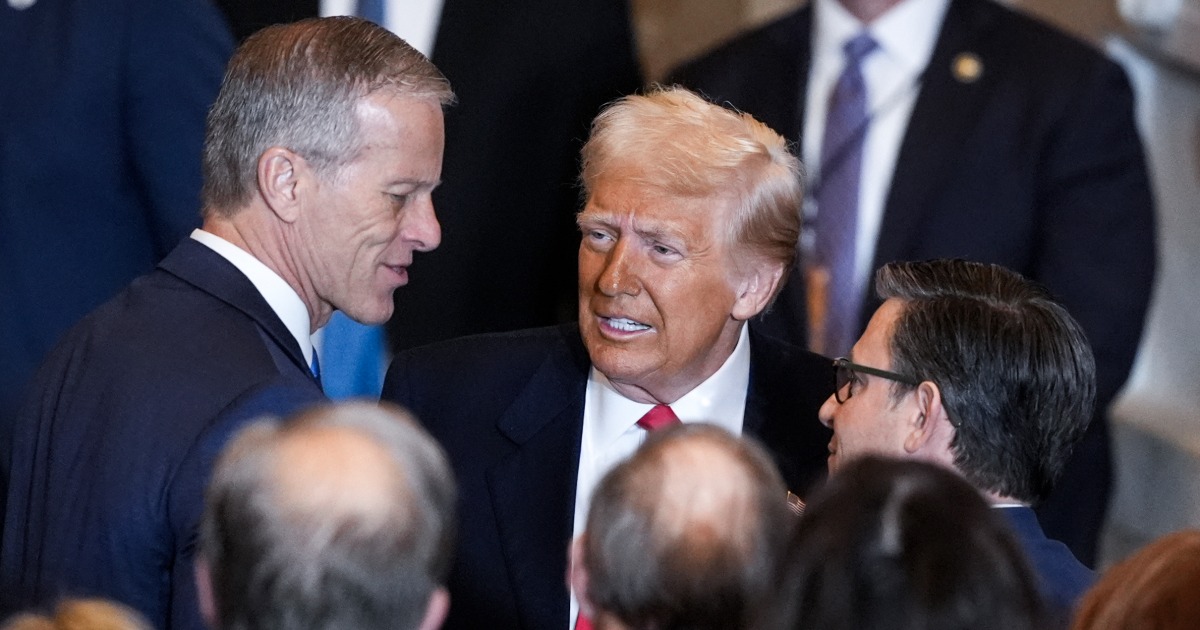BREAKING: President Donald Trump has urgently called on Senate Republicans to abolish the 60-vote filibuster rule, aiming to reopen the government without the need for Democratic votes. However, Trump is facing immediate and strong opposition from key figures within his own party, creating a significant political clash.
In a series of late-night social media posts on Thursday, Trump stated, “It is now time for the Republicans to play their ‘TRUMP CARD,’ and go for what is called the Nuclear Option — Get rid of the Filibuster, and get rid of it, NOW!” He emphasized that doing so would “IMMEDIATELY end this ridiculous, Country destroying ‘SHUT DOWN.’”
Despite Trump’s impassioned plea, Senate Republican leaders are standing firm in their support of the filibuster. New Majority Leader John Thune, R-S.D., reiterated his commitment to maintaining the 60-vote threshold shortly after the 2024 election. His spokesman, Ryan Wrasse, confirmed that “Leader Thune’s position on the importance of the legislative filibuster is unchanged.”
Senate Majority Whip John Barrasso, R-Wyo., echoed this sentiment, stating that his support for the filibuster remains intact. These commitments highlight a growing fissure within the Republican Party as they navigate the shutdown crisis.
The debate over the filibuster intensified even before Trump’s intervention, notably after Senator Bernie Moreno, R-Ohio, urged his colleagues on Fox News to eliminate the filibuster. However, not all Republicans are on board. Fellow Ohio senator Jon Husted firmly rejected this proposal, stating, “That’s not a step I think we should take.”
Senator Thom Tillis, R-N.C., who has threatened to resign if the filibuster is abolished, expressed skepticism about any change to the current rules. “We stood firm there,” Tillis remarked, referencing Trump’s past calls to eliminate the filibuster. “I can’t imagine anybody changing now.”
Amidst this internal divide, Senator Roger Marshall, R-Kansas, also dismissed the idea of weakening the filibuster. He stated, “That’s a nonstarter,” showcasing a unified front among several GOP senators against Trump’s push.
The legislative filibuster, requiring 60 votes for most bills, has been a crucial mechanism in the Senate since 1975. It serves as a check against sudden shifts in majority power, a concern that has been voiced by numerous Republicans. Thune articulated this fear, noting that if Democrats regain power, they could exploit the absence of the filibuster to advance their agenda unimpeded.
House Speaker Mike Johnson, R-La., acknowledged the significance of the filibuster as a safeguard. “If the shoe was on the other foot, I don’t think our team would like it,” he said, emphasizing its traditional role in protecting minority rights in the Senate.
On the other side of the aisle, Democrats are challenging Republicans to act decisively. Senator John Fetterman, D-Pa., remarked that if Republicans are serious about avoiding future shutdowns, they should eliminate the filibuster for government funding bills. “We all ran on it,” he added, pushing back against any Republican reluctance.
In a dramatic political landscape, Trump’s latest remarks have ignited a firestorm of debate within the GOP, raising the stakes as the government shutdown continues. The urgency of the situation is palpable, with the potential for significant ramifications for both parties.
As the situation develops, all eyes will be on Senate Republicans to see how they will respond to Trump’s bold challenge. Will they maintain their commitment to the filibuster, or will they heed the call for change? The coming days will be critical as lawmakers grapple with the implications of their decisions on the future direction of their party and the government.
